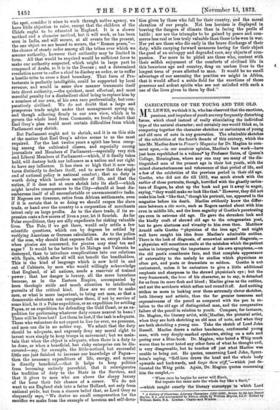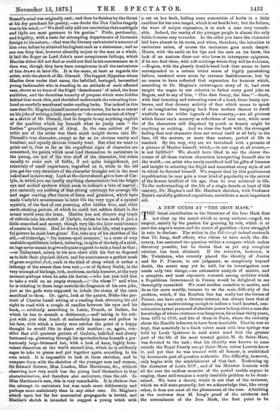4 R. LE WES, we think it is, who has
observed that the emotions,
Ai govern the whole land from Coomassie, we freely admit that passions, and impulses of youth are very frequently disturbing Earl Grey's plan would meet certain difficulties from which forces, which cloud instead of really stimulating the individual Parliament may shrink. type of the natural character; and certainly one would think so, in But Parliament ought not to shrink, and it is on this side comparing together the character-sketches or caricatures of young of the matter that Earl Grey's advice seems to us the most and old men of note in any generation. The admirable sketches required. For the last twelve years a spirit has been creep- of the celebrities of the fourth decade of this century, which the late Mr. Maclise drew in Fraser's Magazine for Dr. Maginn to com- ment upon,—in our amateur opinion, Maclise's best work—have and Liberal Members of Parliament—which, if it finally takes just been republished in a volume* by Professor Bates, of Queen's hold, will destroy both our influence as a nation and our right College, Birmingham, where any one may see many of the die- to have any influence. It has risen so high that it now ven- tinguished men of the present age in their hot youth, with the mixed characterlessness and vehemence of that period of life, and of externality to the malady he studies which physicians so often get, and poets or dramatists so seldom. Goethe is not caricatured, unless it be caricature to give a little additional very framework, the bone of his character, so to say, is detached "when once he begins ho never will flinch,
Mediae, II A ,,and accompanied by Noices, chiefly by William Meg* at D. Edited by
Russell's mind was originally cast; and then he finishes by the thrust a cat on her back, boiling some concoction of herbs in a little
at his dry penchant for poetry, —no doubt the Don Carlos tragedy was in his mind,—" We shall only add our conviction that madrigals and idylls are most germane to his genius." Pride, pertinacity, and frigidity, with a taste for attempting departments of literature foreign to his nature,—that was the literary caricaturist's account of him even before he attained his highest rank as a statesman ; and no one can deny that, however absurdly unjust to the man as a whole, it laid the finger on Lard John's most conspicuous failings, which Maclise either did not find or could not find in his countenance as it then was, though they have been conspicuous in all the caricatures of him drawn in later life. It is the same, at least as regards the artist, with the sketch of Mr. Disraeli. The foppish Hyperion whom Maclise drew under that name, the befrilled, beringed, berosetted young fashionable who is standing in an attitude of such affected ease, shows us no trace of the frigid detachment' of mind, the keen ambition, and the dauntless tenacity of purpose which were hidden behind that weak chin, and cherished underneath the retreating fore- head so carefully emothered under curling locks. Nor indeed in this case does Dr. Maginn himself succeed much better, for he is so intent on his joke of writing a little parody on "the wondrous tale of Alroy" as a sketch of Mr. Disraeli, that he forgets to say anything explicit of the qualities which lay beneath what be justly calla " the fustian" grandiloquence of Alroy. In the case neither of the critic nor of the artist was there much insight shown into Mr. Disraeli's true character, except so far as its obvious vanity and bombast, and equally obvious vivacity went. But what we want to point out is, that so far as the superficial signs of character are concerned, the points which moat lend themselves to caricature in the young, are not of the true stuff of the character, but relate usually to some sort of foible, if not quite insignificant, yet relatively of small importance, engrafted on it, while in the old you get the very structure of the character brought out in the most naked and incisive way. Look at the cleversketch given here of Car- lyle, in which you see hardly anything characteristic but the bright eye and arched eyebrow which seem to indicate a love of marvel ; you certainly see nothing of that strong contempt for average life and eager craving after traces of force and grandeur, which have made Carlyle's countenance in later life the very type of a cynical mystic's, of the face of one yearning after hidden fires, and other earth-shaking powers, of which he could but seldom detect in the actual world even the trace. MacRae has.not thrown any touch of ridicule into his sketch of Carlyle, unless he has made it, just a little conceited and moony, though very like the later countenance of course in feature. Had he drawn him in later life, what a power- ful picture he must, have given! For, take any of his sketches, of the old,—of Coleridge, ",the heaven-eyed creature," in a state of very unstable equilibrium indeed, tottering, in spite of the help of a stick, on legs never meant to give adequate support to such a head as that ; —or Talleyrand, asleep in his arm-chair with his feet so disposed as to hide their physical defect, and for countenance a perfect mask of gross scepticalfiesh, sunk in the kind of sleep which is rather a lethargy of the senses than true rest ;—or of Sydney Smith, in the very triumph of his huge, rich, unctuous, earthly humour, at the very moment perhaps when he asks his doctor,—who has just told him to take a walk on an empty stomach,—" On whose ?" and when he is inhaling in those large nostrils the fragrance of his own joke, just as the gods were supposed to inhale the steam of the oxen sacrificed to them. Or, again, look at the quaint, Blake-like por- trait of Charles Lamb sitting at a reading-desk, straining his old sight to read with a couple of candles between his eyes and his book, — evidently something in Latin, French, or Italian, for which he has to consult a dictionary,—and' taking in his sub- ject with just that touch of melancholy humour and pathos in his face, with which a lonely man catches the point of a happy thought he would like to share with another ; or, again, con- sider that still quainter picture of Godwin, befrilled and closely buttoned-up, glowering through his spectacles from beneath a por- tentously large-brimmed hat, with a look of keen, highly bene- volent dissection at the world around him, which he is evidently eager to take to pieces and put together again according to his own mind. It is impossible to look at these sketches, and to compare them with the sketches of the younger men and women, Sir Edward Bulwer, Miss Landon, Miss Martineau, &c., without observing how very much less the young lend themselves to true characterisation, and therefore also caricature, than the old. In Miss Martineau 's case, this is very remarkable. It is obvious that the attempt to caricature her was made more deliberately and perhaps more maliciously than in any other case. Dr. Maginn's attack upon her for her economical propaganda is brutal, and Maclise's sketch is intended to suggest a young witch with cauldron for her own teapot, which is set beside her; but the failure, the want of unique expression, is in such a case very remark- able. Indeed, the vanity of the younger people is almost the only foible it seems easy to render. In the older you have the character laid bare almost to its roots, and when, therefore, the intention to caricature exists, of course the caricature goes much deeper. Moore, with the smile on his lips and the care on his brow, the look of an anxious diner-out who loves to intersperse epigrams, if he can find them, with soft nothings where they will be welcome, —Rogers, with the ghastly death's-head look that seems to have corresponded to a certain bitter sense of highly painstaking failure, rendered more acute by extreme fastidiousness, but by no means to have reflected that reputation for humour which, according to Dr. Maginn's extravagant story of it, had even taught the negro in our colonies to father every good joke on Rogers, and to say of him, "Him dam funny, dat Sam !"—Scott, with that towering and retreating cone of a head, those bushy eye- brows, and that dreamy activity of face which seems to speak of an imagination hanging back from modern themes to dwell wistfully on the wilder legends of his country,---are all pictures which haunt one's memory as reflections of real men, while most of the characters still disguised by youth or beauty might be anything or nothing. And we close the book with the strongest feeling that real character does not reveal itself at all fully in the face, till the mature, or more than mature, period of life is reached. By the way, why are we tantalised with a promise of a picture of Maclise himself, which,—in our copy at all events,— is not fulfilled ? We should have liked to see the clever dis- cerner of all these various characters interpreting himself also to the world,—an artist who surely sacrificed half his gifts of humour and insight in selecting the frigid and somewhat stony style of art to which he devoted himself. We suspect that by this posthumous republication he may gain a truer kind of popularity as ttio mirror of the keener intellect of his age, than he ever achieved in life. To the understanding of the life of a single decade at least of this century, Dr. Maginn's and Mr. Maclise's sketches, with Professor Bates's carefully gathered expositions, contribute a most important aid.



































 Previous page
Previous page